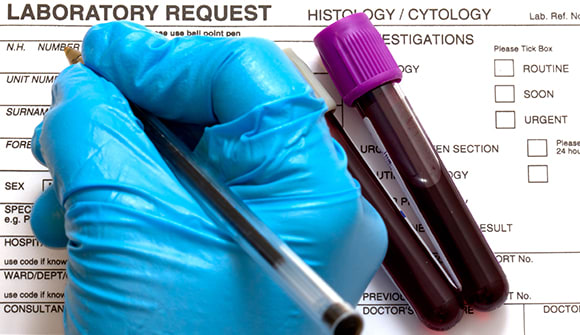Prevention is the best medicine
8 life-saving screenings to schedule today!
Article Author: Wesley Roberts
Article Date:

Your primary care doctor not only looks after your physical health, but also checks in with your spiritual and mental health, caring for the whole person. He or she is your partner in prevention, not just treatment.
“Don’t wait until you have a problem to see a doctor,” explained Kelly Rich, MD, a family physician at Baptist Primary Care. “We’re here for you before you get sick. Many screenings and tests help us stay on top of your health, as a team.”
8 Life-Saving Screenings
Blood Pressure Test
Known as “the silent killer,” high blood pressure doesn’t always have symptoms but can lead to stroke, blood clots, heart failure and other serious medical conditions.
“The recommendation for blood pressure screening starts as early as the age of three,” explained Dr. Rich. “High blood pressure affects one in three adults and it’s a growing problem in children.”
At each appointment, Dr. Rich has her patient’s blood pressure checked. For those who have known complications or a family history of high blood pressure, blood pressure should be monitored more frequently. At-home blood pressure monitors can be purchased at Walgreens.
“Knowing your family medical history is so valuable,” said Dr. Rich. “Keep you primary care physician updated of any changes in family history relating not just to high blood pressure, but to all medical conditions.”
Pap Smear
Ladies, we’re talking to you! A Papanicolaou (Pap) smear is a screening for cervical cancer, testing for the presence of precancerous or cancerous cells on the cervix. It’s an essential part of a woman’s health care.
The U.S. Preventative Task Force recommends that women between the ages of 21 and 65 be screened for cervical cancer with a Pap smear every three years. Average-risk women ages 30 to 65 should be screened every five years with both a Pap smear and HPV test.
Women younger than 21, older than 65 and those who have had a total hysterectomy don’t need to have a Pap smear.
“The Pap test is done to identify changes in the cervix before cancer develops or to find cervical cancer early, at its most treatable stage,” explained Dr. Rich.
In 1940s, cervical cancer was a major cause of death among American women. However, when the Pap smear was introduced in the 1950s, the incidence of invasive cervical cancer decreased by more than 60% between 1955 and 1992.
“We also know that nearly all cervical cancers are associated with human papillomavirus (HPV),” said Dr. Rich. “Vaccinations for HPV are also a critical part of preventing cervical cancer.”
According to the Centers for Disease Control and Prevention, the HPV vaccine is recommended for routine vaccination at age 11. For those not vaccinated when younger, the vaccine is recommended for females age 13-26 and males age 13-21.
“When it’s time for vaccinations, primary care physicians can help keep you and your family on track,” said Dr. Rich. “Like screening, vaccines are an important part of prevention.”
Cholesterol Test
Our bodies need a certain amount of cholesterol, but buildup of the “bad” cholesterol type (low-density lipoprotein or LDL) can be dangerous and increase risk of heart disease. “Good” cholesterol (high-density lipoprotein or HDL) helps remove other forms of cholesterol from your blood stream and its associated with a lower risk of heart disease.
Cholesterol testing is often done during routine blood work. For those without risk factors like obesity, family history or high blood pressure, recommended screening should begin at age 35 for males and 45 for females.
“High cholesterol is often preventable and treatable,” said Dr. Rich. “However, there are no ‘warning signs’ of too much bad cholesterol until it affects your arteries. That’s why having a doctor test your cholesterol level is very important.”
Tip for maintaining good cholesterol levels include:
- Eating a heart-healthy diet
- Exercising regularly
- Quitting smoking
- Maintaining a healthy weight
Mammogram
Like Pap smears, mammograms save lives by finding breast cancer early, when treatment is most likely to be successful. Beginning at age 40, women should have an annual screening mammogram. For those with a family history of breast cancer, screening should start earlier.
Annual mammograms lower a woman’s chance of death from breast cancer by 30-40% according to the American College of Radiology. Are these mammogram myths keeping you away from your regular screening?
Calcium Scoring
Coronary calcium scores are measured with a cardiac CT scan, a noninvasive way to learn more information about the presence and extent of calcified plaque in vessels that supply oxygen-rich blood to the heart.
“Coronary calcification is a marker for cholesterol plaque. It correlates with the severity of a patient’s coronary artery disease but doesn’t correlate with the degree of narrowing of the arteries,” said Pamela Rama, MD, cardiologist with Baptist Heart Specialists. As the score increases, the likelihood of significant coronary artery disease and cardiac events increase over the next 5 years.”
Dr. Rama recommends calcium scoring to patients who are older than 35, especially smokers or those with a family history of early coronary artery disease. She said she also has patients who simply want to know their calcium score to know their risk for a cardiac event like heart attack.
A score of 1-10 means there is a small amount of plaque and risk for heart attack is low. Based on the severity of the findings, a patient can then work with a cardiologist to develop a plan of action to prevent a major cardiac event.
Colonoscopy
A colonoscopy is an exam that views the inside of the colon, or large intestine, and rectum.
“Colonoscopy is considered the gold standard of colorectal cancer screening,” said Dr. Rich. “Both men and women should have colonoscopies starting at age 50 and continue every 10 years.” She also added that if you have a family history, screening should begin 10 years earlier.
According to the American Cancer Society, colorectal cancer is the third most common cause of cancer-related deaths among both men and women, but if caught early, colorectal cancer has a 90% survival rate.
Depression Screening
If you’ve had a physical or well visit recently, your health care provider likely asked these two questions:
- Over the last two weeks, how often have you had little interest or pleasure in doing things?
- Over the last two weeks, how often have you been feeling down, depressed or hopeless?
These questions, known as the Patient Health Questionnaire-2 or PHQ-2, are inquiries about the frequency of a depressed mood.
“This screening is done to detect depression in a first-step approach,” said Dr. Rich, who explained that patients who screen positive should be further evaluated. “With the incidence of depression getting higher every year, this screening can make a critical difference in someone’s life.”
Diabetes Test
The U.S. Preventive Services Task Force recommends screening for abnormal blood glucose and type 2 diabetes in adults ages 40 to 70 who are overweight or obese, and also recommends repeating testing every three years if results are normal.
Diabetes is a long-term disease in which the body can’t regulate the amount of glucose (sugar) in the blood. Insulin is the hormone produced by the pancreas to control blood sugar. Type 1 diabetes, which is less common, is often diagnosed in children or teens. With this disease, the body makes little or no insulin. With type 2 diabetes, often occurring in adulthood, the body is resistant to insulin.
A diabetes test can detect prediabetes, thus allowing patients to make lifestyle changes like losing weight, increasing activity and eating a healthy diet, to prevent type 2 diabetes.
Diabetes can lead to many health issues including heart disease kidney damage, a weakened immune system, and more.
Each patient is unique in regards to family history and other disease risk factors. Your primary care physician (PCP) will know the right screenings for you and offer you an individualized approach to health care. Have a PCP on your team.
Looking for a primary care physician who’s right for you? Call 904-123-4YOU or visit baptistjax.com/request.



